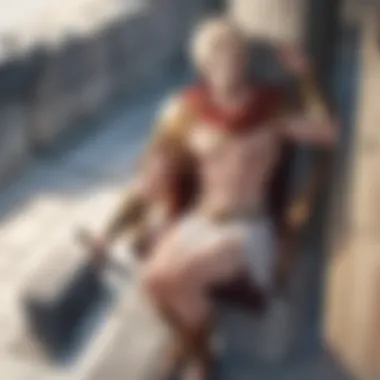Leonidas I: The Legacy of the Spartan King


Intro
Leonidas I stands as a pivotal figure in history, known primarily for his leadership during the Battle of Thermopylae. His legacy endures, resonating through various cultural mediums. This exploration will illuminate the significant attributes of Leonidas, delving deeper into not only his character and military strategies but also the philosophical underpinnings of Spartan society that shaped his actions.
In examining Leonidas's story, we will also assess how modern media, particularly anime and manga, have reinterpreted his narrative, emphasizing themes of heroism and sacrifice. Let us embark on this journey to uncover the multifaceted legacy of the Spartan king.
Character Profiles
Overview of Main Characters
Leonidas I, the Spartan king, is often depicted not only as a warrior but as a symbol of bravery and sacrifice. His decision to stand against the much larger Persian army signifies his commitment to his people and ideals. The stark contrast between the disciplined Spartan way of life and the invading Persian forces sets the stage for his legendary stand at Thermopylae.
In addition to Leonidas, other characters play crucial roles in this narrative. Queen Gorgo, his wife, illustrates the strong women of Sparta. She embodies wisdom and courage, providing political acumen during Leonidas's absence.
Supporting Characters
Among the soldiers, a few other notable figures stand out. Dienekes, a seasoned warrior known for his stoicism, provides a lens into the Spartan mindset. Another significant character is Xerxes I, the Persian king. His ambitions serve as a backdrop to Leonidas's resistance, highlighting the stark differences in values and culture between the east and west.
Theme Exploration
Central Themes
The themes of heroism and sacrifice dominate the narrative of Leonidas's life. His choice to lead a small contingent of soldiers against overwhelming odds speaks to a broader notion of duty towards one’s homeland. This notion resonates deeply within the Spartan ethos, which values courage and honor above all.
Cultural References
The legacy of Leonidas has been reinterpreted in various forms of media, especially in anime and manga. For instance, the popular series Attack on Titan reflects similar themes of standing against insurmountable odds. The character arcs often mirror the boldness of Leonidas, allowing for a deeper appreciation of his historical significance.
"The glory of Sparta lies not just in their victories but in their ideological convictions that shaped their responses to threats."
Popular Series and Recommendations
Top Anime Series of the Year
- Attack on Titan
- Vinland Saga
- Kaguya-sama: Love Is War
These series offer narratives that resonate with the essence of sacrifice and honor found in Leonidas's story.
Hidden Gems in Manga
- Berserk
- Hokushin Engi
- Kengan Ashura
These titles explore complex themes of bravery, leadership, and the burdens that come with such roles.
Prelude to Leonidas
Understanding Leonidas I is crucial for comprehending the broader narrative of ancient Greece and the significance of Spartan society. He emerged as a pivotal figure during one of the most critical moments in history. His leadership during the battle against the Persian Empire has become emblematic of bravery and sacrifice in defense of one's homeland.
Leonidas’s actions at Thermopylae have transcended time. They resonate through various cultural forms, especially in literature and more contemporary media such as anime and manga. These narratives not only celebrate heroism but also reflect deeper themes of sacrifice and loyalty that are prevalent in Spartan culture. By exploring his life and legacy, we gain insights into the values and codes that governed Spartan society, further enriching our understanding of this remarkable civilization.
Historical Background
Leonidas I, born into the Agiad royal family around 540 BC, ruled as the king of Sparta from approximately 490 BC until his death in 480 BC. His lineage ties him to a long line of Spartan rulers who were responsible for maintaining the city-state's military prowess and societal structure. Sparta was not merely a city; it was a formidable entity defined by strict military discipline and rigorous training.
The backdrop of his leadership is marked by the growing threat of Persia. Multiple Greek city-states faced the impending invasion, and it was in this context that Leonidas rose to prominence. The Persian Wars, particularly the Battle of Thermopylae, played a significant role in shaping not only Leonidas's legacy but also the course of Western civilization.
Cultural Significance of Sparta
Spartan culture was unique and distinctly focused on producing formidable warriors. The ideals of agoge, the rigorous education and training regimen for Spartan boys, emphasized physical strength, discipline, and resilience. This training was a cornerstone in creating soldiers who were not only skilled but also deeply loyal to their city-state.
Sparta's societal structure revolved around a dual monarchy, where kingship was shared between two royal families, including Leonidas’s own. This unique political arrangement contributed to the state's ability to mobilize quickly against external threats.


Moreover, myth and reality blended in Spartan society. The values of honor, loyalty, and sacrifice were not just ideals; they were embedded in the daily lives of Spartans. The story of Leonidas, particularly at Thermopylae, became a profound representation of these values, influencing perspectives on heroism, duty, and resilience for generations to come.
"The duty of a Spartan was not just to fight but to embody the very essence of the city-state, marking a legacy of strength and honor that's still revered today."
This cultural foundation shapes the allure of Leonidas as a subject of study and admiration, attracting scholars, historians, and enthusiasts alike. In current popular culture, he remains a symbol of resilience, consistently encapsulated in narratives that celebrate individual courage against overwhelming odds.
Leonidas in Historical Context
The era in which Leonidas I lived was marked by intense conflict and political turmoil. Understanding this historical context is imperative, as it shapes both the actions of Leonidas during the Persian Wars and his representation as a timeless icon of heroism. The Age of Antiquity, particularly during the fifth century BCE, was characterized by the rise of powerful city-states, alongside increasing external threats. Leonidas's Sparta, renowned for its military discipline, stood at the forefront of this struggle between Greek states and the Persian Empire.
The Persian Wars
The Persian Wars were a series of conflicts that ignited from 499 to 449 BCE, fueled by the expansionist ambitions of the Persian Empire. The most notable battles in these wars include Marathon, Salamis, and, of course, Thermopylae. Leonidas’s leadership became critical during this period, especially as he commanded the Spartan forces at the narrow pass of Thermopylae, where he made his famous stand against King Xerxes I of Persia.
This engagement was not merely a battle; it was a pivotal moment that defined Greek unity in the face of a common enemy. The significance here lies in how Leonidas emerged not just as a general of Sparta, but as a symbol of defiance. His choice to remain and fight, even knowing the overwhelming odds, demonstrated unwavering courage and provided an enduring narrative for generations.
"Leonidas did not merely lead men into battle; he inspired a legacy of resistance that echoes throughout history."
By understanding the broader implications of the Persian Wars, one can appreciate how Leonidas's actions at Thermopylae became a microcosm of the struggle between freedom and tyranny. His leadership exemplified the Spartan ideal, merging collective effort with individual valor, further immortalized through historical accounts and literature.
Political Landscape of Ancient Greece
The political atmosphere in Ancient Greece was not static; it was marked by power struggles and alliances among city-states. Sparta and Athens were the two dominant forces, often clashing due to differing ideologies—Sparta embodied militaristic values, while Athens promoted democracy and trade. This rivalry influenced military strategies and alliances that shaped the course of the Persian Wars.
Leonidas’s leadership occurred against a backdrop of intense political maneuvering. By taking a stand at Thermopylae, he not only demonstrated the strength of Spartan valor but also stressed the importance of unity among the Greek states against a formidable foe. His actions prompted other city-states to recognize the value of cooperation, leading to the eventual formation of a decentralized coalition that would successfully resist Persia.
At this critical juncture, Leonidas emerged as a critical figure not just in military terms, but also as a player in the complex web of alliances that defined his era. His legacy extends beyond his personal courage; it is also about the influence he had on the political fabric of Ancient Greece, shaping ideals of leadership and resistance that would resonate through time, inspiring future generations.
Leonidas's Role in the Battle of Thermopylae
Leonidas I's significance during the Battle of Thermopylae is profound. His leadership and strategic choices are often studied in military academies even today. At the heart of this historic confrontation was the clash between a vastly larger Persian force and a small, determined contingent of Greek soldiers. Leonidas’s decision to stand with 300 Spartans, along with their allies, was a defining moment that shaped the narrative of sacrifice and heroism. This battle was not only a military engagement; it was a cultural symbol that resonated throughout history.
Strategic Importance of the Location
The Thermopylae pass was strategically vital. This narrow route between the mountains and the sea limited the effectiveness of the Persian army, which was estimated to be in the hundreds of thousands. The geography allowed a smaller force to hold off a much larger one. Leonidas understood this advantage well. By positioning his troops there, he intended to delay the Persian advance while providing time for other Greek city-states to prepare for war.
Moreover, controlling Thermopylae meant controlling access to central Greece. If the Persians passed through, they would threaten not just Spartan territory but all of Greece. Leonidas's gamble was not merely to defend a location; it was about stalling an unstoppable force long enough for a united Greek response.
Tactics Employed by Leonidas
Leonidas's military tactics were sophisticated for their time. First, he organized his men into a phalanx, a tight formation that maximized their fighting capabilities. This tactic made it difficult for the Persian cavalry and archers to break through. The discipline of Spartan warriors allowed them to hold this formation effectively, even under extreme pressure.
Additionally, Leonidas utilized the natural terrain to his advantage. By drawing the enemy into close quarters, he negated their numerical superiority. His strategy included not just defensive measures but also occasional offensive strikes that caught the Persian forces off guard.
Leonidas was also a master of morale. He understood the psychological aspects of warfare. By showing bravery in the face of death, he inspired his men to fight with unparalleled courage. This willingness to face overwhelming odds transformed the battle from a simple military engagement into a significant cultural narrative of heroism.
"The glory of Leonidas and his men lies not simply in their bravery, but in their refusal to surrender in the face of certain death."
In summary, Leonidas's role in the Battle of Thermopylae showcases his profound impact on tactics and strategy in ancient warfare. His awareness of geography, skill in military formations, and ability to inspire those around him make his actions at Thermopylae a timeless study in leadership.
Leadership Qualities of Leonidas
Leonidas I exemplified traits that were vital for his role as a leader during one of history's most piviotal moments. His qualities were not merely beneficial; they shaped the very fabric of Spartan identity and influenced their military effectiveness. Understanding these leadership attributes helps comprehend why Leonidas remains a prominent figure, not only in historiography but within modern cultural narratives.
Decisiveness in Battle
Decisiveness is perhaps one of the most significant qualities attributed to Leonidas. In the heat of battle, effective leadership often hinges on the ability to make swift and resolute choices. At Thermopylae, Leonidas faced overwhelming odds against the Persian forces. His decision to make a stand, despite the likelihood of defeat, showcased an unwavering commitment to his principles and people. This timing was crucial, as each moment spent deliberating between options could have led to panic or disarray among his troops.
Leonidas's decisiveness also exemplified a strategic mind. He evaluated the battlefield intricacies and exploited the narrow pass of Thermopylae. By choosing this location, he not only defended against a larger army but also shaped the narrative of his leadership. Such clear and assertive strategies fostered loyalty among his men and boosted their morale, demonstrating how important decision-making is in leadership.
Inspiration and Morality


Inspiration and morality are twin pillars of Leonidas's legacy. He represented the Spartan values of honor, bravery, and duty. His actions in battle were not just about achieving military success but about embodying higher ideals that resonated with his soldiers. Through his conduct, Leonidas inspired his warriors to embrace their fates with courage. This is particularly significant as it shows that true leadership goes beyond mere orders; it requires a moral compass that aligns the leader's actions with the values of their society.
Leonidas's ability to inspire is well reflected in the accounts of his last stand. He rallied his troops and stood firmly at the forefront during the battle. The phrase "Molon Labe," meaning "come and take them," illustrated his refusal to surrender. This declaration not only incited a fighting spirit within his ranks but also crafted a narrative of defiance against tyranny that transcends time.
The Ideals of Spartan Society
The ideals of Spartan society serve as a crucial lens through which to examine the legacy of Leonidas I. These principles not only influenced Leonidas’s actions but also set a benchmark for leadership and valor during his time. At the heart of Sparta's societal system lie concepts such as honor, duty, and rigorous education. These played significant roles not just in shaping warriors but in cementing the cultural backbone of Sparta itself.
Honor and Duty in Spartan Culture
Honor and duty were not merely buzzwords for the Spartans; they were the pillars of their society. From a young age, Spartans were indoctrinated with a strong sense of loyalty to their city-state and their comrades. Honor dictated every aspect of life, especially in combat. The Spartan phrase "Come back with your shield, or on it" encapsulates this sentiment, emphasizing the ultimate sacrifice expected of each soldier. This encapsulated a culture where abandoning one's duty was seen as dishonorable.
Moreover, the emphasis on honor extended beyond military prowess. It applied to familial duties and civic responsibilities as well. Citizens were trained to uphold their family’s name, ensuring that their legacy was one of respect and valor. This profound respect for duty created an unbreakable bond among citizens, fortifying the communal spirit vital during times of conflict.
Education and Training of Spartans
The education and training of Spartans was meticulously structured, known as the Agoge. This system was designed to produce formidable warriors and disciplined citizens. From the age of seven, boys were removed from their homes to begin a rigorous training regime that would last until they turned twenty. They learned not only combat skills but also the values of endurance, resilience, and teamwork.
The Spartans believed that physical training was inseparable from mental development. The Agoge included survival skills, stealth, and even music and dance, understanding that a well-rounded citizen made a stronger warrior. The women of Sparta also received an education, albeit different, focusing on managing households and fostering a culture of strength.
Legacy and Cultural Impact of Leonidas
Leonidas I remains a central figure in the dialogue surrounding heroism, leadership, and sacrifice, particularly in the context of Spartan culture. His actions during the Battle of Thermopylae have transcended time, influencing various aspects of literature, cinema, and modern media. This section examines how Leonidas's legacy has been shaped by historical accounts and how his story continues to resonate in contemporary interpretations.
Historical Accounts and Literature
Historical accounts of Leonidas's life often paint him as an archetype of bravery and honor. Ancient historians such as Herodotus captured the events of Thermopylae, framing Leonidas's choices within a narrative of valor against overwhelming odds. His defiance against the Persian Empire represents not just a military stand but a philosophical commitment to freedom and duty.
In literature, Leonidas's legacy has inspired numerous works that analyze his character and the values he epitomizes. These texts often address themes of heroism and sacrifice, delving deeper into the societal implications of his actions. Some notable examples include:
- "The Histories" by Herodotus: This work remains a fundamental source of information regarding the events at Thermopylae.
- "The 300 Spartans" by Frank Miller: A graphic novel representation of the battle that played a crucial role in popularizing Leonidas's image.
- "Gates of Fire" by Steven Pressfield: A historical novel that provides a detailed account of the battles leading up to Thermopylae, focusing on Spartan culture and values.
These accounts not only memorialize Leonidas but also serve as a reflection on identity and courage in the face of adversity.
Leonidas in Modern Media
Films and Documentaries
The portrayal of Leonidas in films and documentaries has significantly contributed to the understanding of his legacy. One prominent example is the movie 300, directed by Zack Snyder. This adaptation is celebrated for its stylized visuals and dramatic narrative, which highlight the valor of Leonidas and his warriors. Key characteristics of such films include:
- Visual Storytelling: The use of cinematography enhances the narrative, emphasizing the emotional highs and lows of battle.
- Simplified Storylines: These narratives often prioritize entertainment over historical accuracy, which can lead to an idealized portrayal of Leonidas.
While 300 has popularized Leonidas, it is also noted for its dramatic liberties, which some critics argue compromise the historical context. Thus, while engaging, such films should be viewed as interpretations rather than definitive accounts.
Interpretation in Anime and Manga
The reflection of Leonidas in anime and manga further showcases his cultural impact, particularly in Japanese media. Titles like Attack on Titan and Heroic Legend of Arslan draw inspiration from his narrative, focusing on themes of sacrifice and unwavering loyalty.
Key aspects of this interpretation include:
- Character Archetypes: Many protagonists exhibit traits reminiscent of Leonidas, such as indomitable courage and a commitment to their comrades.
- Moral Dilemmas: These stories often explore complex decisions faced by leaders, paralleling Leonidas's own struggles.
Though these interpretations may dilute certain historical details, they enrich the conversation surrounding heroism by framing Leonidas’s story in accessible formats for a younger audience. This adaptation serves to inspire new generations, illustrating the enduring nature of his legacy.
"The legacy of Leonidas I is not confined to history; it finds expressions in the stories we tell and the heroes we celebrate today."
Philosophical Themes Associated with Leonidas
Examining Leonidas I and his legacy uncovers profound philosophical themes that resonate through history and into contemporary thought. These themes reflect the essence of Spartan culture and the broader implications of heroism, selflessness, and duty. Understanding these elements provides insight into how Leonidas is not just a historical figure, but a symbolic representation of ideals that continue to inspire.
Heroism and Sacrifice


The concept of heroism is central to the memory of Leonidas I. He epitomizes what it means to be a hero through his actions at Thermopylae. Leonidas did not just fight; he faced overwhelming odds, leading a small contingent against a massive Persian army. This act of defiance serves as a profound lesson in sacrifice. His choice to stand and fight, even against certain defeat, embodies the idea that true heroism often involves personal loss for the greater good.
In literature and various modern media, Leonidas is portrayed as the ultimate hero. His famous last stand is frequently referenced, showcasing how a single person or group can impact the course of history through courage and unwavering commitment. This aspect of his legacy reminds us that heroism is not solely defined by victory but by the willingness to stand firm in one's beliefs regardless of the outcome.
"It is not the strongest who survive, but those most responsive to change."
- Leonidas, in spirit, conveying the importance of resilience.
The sacrifices made by Leonidas and his warriors have inspired countless individuals and movements throughout history, suggesting that personal sacrifice can catalyze change and evoke a sense of duty among others. This theme of sacrifice influences various realms, from literature and film to leadership practices, reinforcing the idea that acts of bravery are sometimes necessary for a higher cause.
Leadership and Loyalty
Leadership is another critical theme associated with Leonidas. His ability to inspire loyalty in his men is a testament to not only his character but also to the overarching values of Spartan society. Effective leaders foster trust and respect, qualities that Leonidas exhibited profoundly. His troops were willing to follow him to their deaths not because they were forced but because they believed in his vision and his integrity.
Loyalty in the context of Leonidas extends beyond mere obedience. It reflects a shared commitment among his soldiers to defend their homeland and support their king. In a broader sense, this theme resonates with modern leadership principles. It emphasizes that today’s leaders must earn loyalty through respect, understanding, and inspiring a shared purpose.
In conversations about effective leadership, Leonidas serves as a case study. His decisions during the battle displayed not just strategic prowess but also a profound understanding of his men. By fostering camaraderie and embodying the ideals of Spartan valor, he created a legacy that continues to inform both military and civilian leadership today.
The influence of Leonidas on modern leadership is significant. His approach to loyalty and sacrifice can serve as a guiding principle for those in positions of authority, reminding them that authentic leadership stems from genuine connections with those they lead.
As we analyze the themes surrounding Leonidas, it becomes clear that his legacy goes beyond his historical actions. It invites ongoing reflection on what it means to be a leader, a hero, and a loyal follower of a cause. Through these philosophical themes, we can appreciate the enduring relevance of Leonidas’s story in both historical and contemporary contexts.
Contemporary Interpretations of Leonidas
The legacy of Leonidas I persists through various interpretations in modern contexts. His story of bravery and resistance offers a wealth of insights. These modern interpretations serve to reshape perceptions of valor and leadership today. They allow people to draw parallels between ancient and contemporary struggles.
Symbol of Resistance
Leonidas has become a metaphor for resistance against overwhelming odds. This symbolism is particularly strong in various modern conflicts, emphasizing the fight for freedom and dignity. His last stand at Thermopylae is frequently referenced in speeches and writings that advocate for moral courage.
The resonance of Leonidas's story is evident in different social movements. Activists across the globe utilize his image to inspire action against tyranny and oppression. This cultural appropriation reflects how Leonidas embodies the spirit of defiance. For instance:
- His example can be seen during civil rights movements.
- Many military leaders look to Leonidas as an archetype for courage.
Notably, video games and graphic novels highlight his role, reigniting the conversations surrounding heroism. As a symbol, Leonidas transcends historical context, appealing to those that value integrity in adversity.
"The legacy of Leonidas is one that illustrates the strength of the human spirit when faced with tyranny."
Influence on Modern Leadership
Modern leadership principles often draw inspiration from figures like Leonidas. His ability to inspire loyalty and decisive action is widely studied in leadership training programs. Many leaders today admire his blend of tactical acumen and ethical resolve.
Leonidas's leadership style can be dissected into several key components:
- Visionary Thinking: He foresaw the implications of the invasion and acted accordingly.
- Courage Under Fire: His willingness to face death for a greater cause resonates with leaders striving for excellence today.
- Team Cohesion: Leonidas exemplified the importance of camaraderie, rallying troops under his moral banner.
In the corporate world, many organizations are re-evaluating their approaches to leadership. Companies are now emphasizing the traits Leonidas displayed. Strong values combined with a clear vision are seen as essential in leading teams effectively.
In essence, Leonidas's legacy informs the principles of modern leadership. His story teaches leaders to embrace courage, prioritize values, and foster loyalty within their ranks. The relevance of his actions continues to bridge the gap between past and present.
Culmination
The conclusion of this article holds significant weight as it weaves together the narrative of Leonidas I, resonating with themes of heroism, sacrifice, and leadership. The examination of Leonidas's impact through history not only provides insight into ancient Spartan society but also illuminates how his legacy continues to inspire contemporary thought and culture.
Summation of Leonidas's Impact
From the pivotal stand at Thermopylae to his embodiment of courage, Leonidas serves as a symbol of dedicated leadership. His strategies in battle exemplified tactical brilliance, effectively utilizing the narrow pass of Thermopylae to counteract the overwhelming might of the Persian army. Leonidas's decisions and moral philosophies set a standard not just for his soldiers but also for future generations.
The stories about him have been documented and retold by historians like Herodotus, thus contributing to a collective historical memory. Additionally, the portrayals in literature and arts have kept his legacy alive, making him a beacon of resilience against tyranny even in modern narratives.
Relevance of Leonidas Today
In a world faced with various forms of oppression and challenges, the figure of Leonidas transcends time. His character shows the importance of standing for one's beliefs and defending ideals under dire circumstances. In leadership studies, Leonidas embodies the qualities of decisiveness, integrity, and the willingness to fight for what is right, aspects that resonate with contemporary leaders in various fields.
Moreover, modern media—films, graphic novels, and anime—continues to depict him, reflecting cultural admiration for his valor. This ongoing representation reinforces his relevance and serves as an inspiration for new generations, keeping the spirit of Spartan valor alive.
In summary, this article elucidates the multifaceted legacy of Leonidas I, highlighting not just the man but the enduring ideals he represents. Whether through historical analysis or the lenses of modern interpretations, Leonidas remains a powerful figure in understanding the complexities of leadership, sacrifice, and cultural identity.







